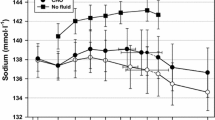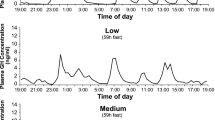Summary
The effect of progressive rehydration with either water or a carbohydrate solution on the plasma growth hormone (GH) and prolactin (PRL) response to exercise was examined together with plasma somatostatin. Five subjects underwent four 3-h experimental sessions at 36°C in which 25-min exercise periods alternated with 5-min rest periods. The sessions were conducted without fluid replacement (DH) or under rehydration with either water or isosmotic carbohydrate solutions AISO (acid) or NISO (neutral). The fluid was given every 10 min after the 1st h of exercise. Plasma GH increased significantly (p < 0.01) under DH after 2 and 3 h of exercise; this increase was prevented by rehydration with water, AISO and NISO. Plasma glucose was significantly higher following AISO and NISO rehydration compared with DH. This possibly influenced the GH response, but there was no difference between plasma glucose levels under DH and water rehydration at any time. The solutions tended to attenuate the increase in heart rate, rectal temperature and plasma cortisol, suggesting that the lack of GH response under rehydration conditions is a result of decreasing physiological stress levels. The GH response could not be explained by plasma somatostatin, which tended to decline in all sessions. Plasma PRL did not increase in any of the sessions, confirming that exercise without rehydration is a more potent stimulator of GH than of PRL. It is concluded that progressive rehydration with water is sufficient to prevent the exercise-induced increase in plasma GH.
Similar content being viewed by others
References
Binnerts A, Wilson JHP, Lamberts SWJ (1988) The effects of human growth hormone administration in elderly adults with recent weight loss. J Clin Endocrinol Metab 67:1312–1316
Brandenberger G, Follenius M, Wittersheim G, Salamé P (1980) Plasma catecholamines and pituitary adrenal hormones related to mental task demand under quiet and noise conditions. Biol Psychol 10:239–252
Brandenberger G, Candas V, Follenius M, Libert JP, Kahn JM (1986) Vascular fluid shifts and endocrine responses to exercise in the heat. Effect of rehydration. Eur J Appl Physiol 55:123–129
Brisson GR, Audet A, Ledoux M, Matton P, Pellerin-Massicotte J, Péronnet F (1986) Exercise-induced blood prolactin variations in trained adult males: a thermic stress more than an osmotic stress. Horm Res 23:200–206
Christensen SE, Jørgensen OL, Møller N, Ørskov H (1984) Characterization of growth hormone release in response to external heating. Comparison to exercise induced release. Acta Endocrinol (Copenh) 104:295–301
Delitala G, Tomasi P, Virdis R (1987) Prolactin, growth hormone and thyrotropin — thyroid hormone secretion during stress states in man. Baillieres Clin Endocrinol Metab 1:391–414
De Meirleir KL, Baeyens L, L'Hermite-Batiaux M, L'Hermite M, Hollmann W (1985) Exercise induced prolactin release is related to anaerobiosis. J Clin Endocrinol Metab 60:1250–1252
Dill DB, Costill DL (1974) Calculation of percentage changes in volumes of blood, plasma and red cells in dehydration. J Appl Physiol 37:247–248
Felig P, Marliss EB, Cahill Jr GF (1971) Metabolic response to human growth hormone during prolonged starvation. J Clin Invest 50:411–421
Follenius M, Brandenberger G, Oyono S, Candas V (1981) Cortisol as a sensitive index of heat intolerance. Physiol Behav 29:509–513
Francesconi RP, Sawka MN, Pandolf KB (1984) Hypohydration and acclimation: effects on hormone responses to exercise/heat stress. Aviat Space Environ Med 55:365–369
Frewin DB, Frantz AG, Downey JA (1976) The effect of ambient temperature on the growth hormone and prolactin response to exercise. Aust J Exp Biol Med Sci 54:97–101
Galbo H, Holst JJ, Christensen NJ (1979) The effect of different diets and of insulin on the hormonal response to prolonged exercise. Acta Physiol Scand 107:19–32
Galbo H, Christensen NJ, Mikines KJ, Sonne B, Hilsted J, Hagen C, Fahrenkrug J (1981) The effect of fasting on the hormonal response to graded exercise. J Clin Endocrinol Metab 52:1106–1112
Hilsted J, Galbo H, Sonne B, Schwartz T, Fahrenkrug J, Schaffalitzky de Muckadell OB, Lauritsen KB, Tronier B (1980) Gastroenteropancreatic hormonal changes during exercise. Am J Physiol 239:G136-G140
Kjaer M, Bangsbo J, Lortie G, Galbo H (1988) Hormonal response to exercise in humans: influence of hypoxia and physical training. Am J Physiol 254:R197-R203
Kuoppasalmi K, Näveri H, Rehunen S, Härkönen M, Adlercreutz H (1976) Effect of strenuous anaerobic running exercise on plasma growth hormone, cortisol, luteinizing hormone, testosterone, androstenedione, estrone and estradiol. J Steroid Biochem 7:823–829
Melin B, Curé M, Pequignot JM, Bittel J (1988) Body temperature and plasma prolactin and norepinephrine relationships during exercise in a warm environment: effect of dehydration. Eur J Appl Physiol 58:146–151
Mills JF (1985) The endocrinology of stress. Aviat Space Environ Med 56:642–650
Reichlin S (1983) Somatostatin. N Engl J Med 309:1556–1563
Rennie MJ, Johnson RH (1974) Effects of an exercise diet program on metabolic changes with exercise in runners. J Appl Physiol 37:821–825
Rolandi E, Reggiani E, Franceschini R, Bavastro G, Messina V, Odaglia G, Barreca T (1985) Comparison of pituitary responses to physical exercise in athletes and sedentary subjects. Horm Res 21:209–213
Roth J, Glick SM, Yalow RS, Berson SA (1963) Secretion of human growth hormone: physiological and experimental modification. Metabolism 12:577–579
Stachura ME, Tyler JM, Farmer PK (1988) Combined effects of human growth hormone (GH)-releasing factor-44 and somatostatin (SRIF) on post-SRIF rebound release of GH and prolactin. A model for GRF-SRIF modulation of secretion. Endocrinology 123:1476–1482
Sutton JR (1977) Effect of acute hypoxia on the hormonal response to exercise. J Appl Physiol 42:587–592
Sutton JR, Lazarus (1976) Growth hormone in exercise: comparison of physiological and pharmacological stimuli. J Appl Physiol 41:523–527
Weitzman ED, Fukushima DK, Nogeire C, Roffwarg H, Gallagher TF, Hellman L (1971) Twenty-four hour pattern of episodic secretion of cortisol in normal subjects. J Clin Endocrinol Metab 33:14–22
Williams TC, Kelijman M, Crelin WC, Downs TR, Frohman LA (1988) Differential effects of somatostatin (SRIH) and SRIH analog, SMS 201–995, on the secretion of growth hormone and thyroid stimulating hormone in man. J Clin Endocrinol Metab 66:39–45
Author information
Authors and Affiliations
Rights and permissions
About this article
Cite this article
Saini, J., Bothorel, B., Brandenberger, G. et al. Growth hormone and prolactin response to rehydration during exercise: effect of water and carbohydrate solutions. Eur J Appl Physiol 61, 61–67 (1990). https://doi.org/10.1007/BF00236695
Accepted:
Issue Date:
DOI: https://doi.org/10.1007/BF00236695




